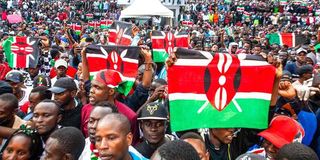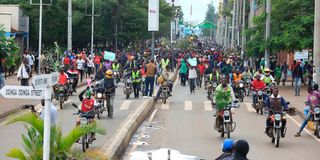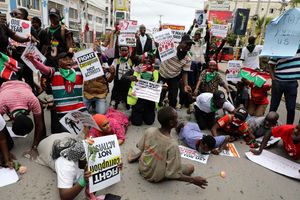
President William Ruto.
President William Ruto and his advisors are facing a different kind of adversary in the youth-led opposition, one that requires a change in tack to handle.
The Gen Zs, as the youngest among the pro-reforms young Kenyans are referred to, showed their force on June while marking the first anniversary of protests that were originally against the Finance Bill 2024, but later spread to include more demands for change to enhance governance.
And on Monday July 7, there are fresh threats for more demonstrations to coincide with the historic Saba Saba day. With their robust online activities and daring stance in the face of a tough police response, the Gen Zs are proving to be a hard nut to crack.
When President Ruto rejected the 2024 Finance Bill and reconstituted his Cabinet on July 11, 2024 to include allies of ODM leader Raila Odinga, he believed he was addressing the demands of the protesting youth and that this would assuage them. He also called for dialogue, but this never took off—and was even more difficult to bring in a group that styles itself as leaderless and partyless. The list of their demands has never stopped growing despite the street protests cooling off until last month.
That President Ruto has also broken some of the promises he made to the youth at the height of the protests has only added fuel to their dissent. For example, he broke his promise to reduce the number of advisors by appointing more to his office. The fact that the youth are so exposed and keep records of every promise made has not helped matters.
Furthermore, Dr Ruto has gone back on his word about banning harambees. The president and his allies are leading the way in spending millions of shillings on fundraisers and "empowerment programs" across the country.

Participants during the Shujaaz Memorial concert held on July 7, 2024 at Uhuru Park in Nairobi.
His allies are back to displaying opulence and extravagance in the face of unemployed youth who swept them into power in 2022.
Dr Ruto, it appears, has limited options.
“Ruto is faced with a horrible dilemma. Convening a dialogue with Gen Z will not only give the movement formal recognition, but will be a public acknowledgement by his administration that the Gen Z have legitimate demands that have not been addressed,” says Prof David Monda, a US-based university lecturer and political analyst.
However, dialogue is not a viable option at the moment as the legitimacy of any of those who come out as the youth leaders will always face questions. Reconciling with the Gen Z in the circumstances will require an extraordinary move.
“Even if President Ruto starts sacrificing members of his administration, it will only embolden the Gen Z to demand more concessions. The ultimate responsibility for the mess ends at State House. And Ruto is not willing to resign. So, he is applying reactionary responses – hard power, uncompromising, force – rather than reconciliation,” Prof Monda notes.
Yet unleashing the full force of the state has only emboldened the youth opposed to his administration. They have become so bold that police stations are no longer a no-go zone even as hired goons are blamed for most of the violence. The latest example is the Mawego Police Station in Homa Bay, which was set on fire on Friday in protest following the killing of Albert Ojwang in June.
There is also grave concern about where and when the Gen Z will stop. The youths have made it clear that they won’t stop until the president leaves office. To some of their key opinion leaders, ceding so much ground is out of the question because it would be like feeding a monster that would come back to attack them.
On June 25, the youth staged yet another major protest to show their displeasure with the ruling class and President Ruto.
They commemorated last year’s historic invasion of Parliament and reminded the government that the issues they raised were still pending. They demanded the president’s resignation, riding on the wave of recent killings of critics and rising abductions.
Evidence-based communication
“The political language and literature have acquired the new lexicon Gen Z, which for all intents is a euphemism for the collection of young people galvanised in opposition to government. Gen Z is opposed to any sit-down or dialogue,” says governance expert Javas Bigambo.
He says President Ruto has to engage in evidence-based communication, with ministries providing such communication about projects in all sectors across the country. Mr Bigambo also believes a raft of reforms is needed, especially in the police and the way the economy.
Kitui Senator Enoch Wambua says dealing with Gen Zs ‘requires a lot more than cleverly crafted public statements’. For Gen Zs, he says, there is no hiding in rhetoric.
“I see in President Ruto a leader who wants to have the best of all the worlds around him: he wants to keep and please his lieutenants even when the masses want them out; he wants to have an advisor for virtually every presidential function against his own public pronouncement; he wants to hoodwink churches, women and youth groups with big money even after promising to do away with harambees,” he says.

Kisumu residents march on Jomo Kenyatta Highway during Saba Saba protests on July 7, 2023. Concern over suppressed and diminishing democratic space for women to fully enjoy their rights arose at the Women Deliver conference in Rwanda.
Ruto recently appeared to show his frustration on how to handle the youths who are emerging not just as a voting bloc, but as a cultural and political movement, when he told them that he would only leave office through constitutional and democratic means.
“If it is Ruto Must Go, tell me how you want me to go. Let’s be honest with ourselves. What do you mean by Ruto Must Go? How do I go? Because we have a constitution in place, dear people, right? If you want Ruto to go, please, my simple advice to you, look for a better plan. Convince the people of Kenya that you have a better plan,” said the President two days after the June 25, protests, which he described as “anarchy dressed in freedom colours”.
His message, however, appeared to target opposition leaders, who have also joined the Gen Zs' chorus in demanding for his exit from office. There’s also growing concern that everything should be done to turn the tide, because they say the prevailing wind is not good for the president’s re-election campaign.
Before dissolving his Cabinet, the President had announced a six-day multi-sectoral dialogue forum, which was later abandoned after the youth rejected it.
In the dialogue, the President proposed the formation of a 100-member National Multi-Sectoral Forum (NMSF) to engage with all stakeholders in ironing out the concerns raised during the protests. The forum was to carry out its activities across all the 47 counties through a participatory, citizen-centric and inclusive process from the ward level.
The President had earlier reached out to the youth by having a conversation with them on X Space on July 5, last year. The stormy session saw the youth take on the President while spelling out their demands.
“We no longer need dialogue. We only have one demand; Ruto must go and the entire regime must go. We need to overhaul the system,” said Mr Mavin Mabonga, a youth and a social media activist.
With the elections about two years away, the Kenya Kwanza administration has come up with programmes designed to appeal to the youth.
The government has since partnered with the World Bank to roll out a Sh20 billion National Youth Opportunity Towards Advancement (NYOTA) project to empower young people in an effort to court the crucial vote ahead of the 2027 elections.
47.6 million people
According to the 2019 Kenya National Bureau of Statistics (KNBS) census, Kenya is a youthful nation with over 75 percent of its 47.6 million people under the age of 35.
In the 2022 voters register, there were 8,811,691 registered voters aged between 18 and 34 – constituting 40 per cent of total number of voters.
These numbers are set to surge going into 2027 polls. In the last election, more than half of the Gen Z were not adults while a chunk of the remaining did not bother registering or even visiting a polling station if registered as voters.
Four in five of the Gen Zs, or more than 14 million, will be eligible for voting, an increase of 79.4 per cent of this cohort that were old enough to register as voters in 2022 when President Ruto swept to power on the back of youth economic empowerment.
Kenyans aged 18 to 34 will number 17.8 million, reflecting the predominant role they will play in deciding the country’s political trajectory from 2027.
“Ultimately, Ruto’s gamble will be tested at the ballot in 2027, if he is able to keep Raila in the broad-based agreement that long. The question is, will Gen Z's come out in sufficient numbers in key counties to ensure the opposition candidate (or Gen Z candidate) is elected? Remember the Gen Z movement is a heretofore unprecedented threat to government. Nothing like it has been experienced before,” notes Prof Monda.






